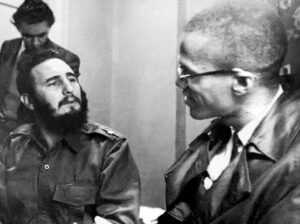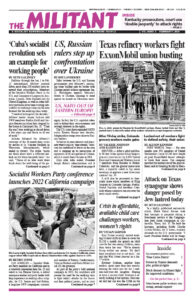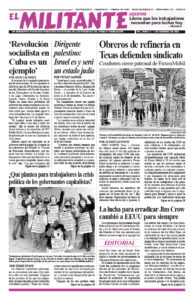
Malcolm X: The Last Speeches is one of Pathfinder’s Books of the Month for February. Malcolm X emerged as an outstanding leader of the popular struggle for Black liberation. An intransigent opponent of the U.S. government and its imperialist policies, he was attracted to the workers and farmers governments that came to power in Algeria and Cuba. As his political evolution accelerated, he spoke with increasing clarity as a powerful spokesperson for the working class as a whole. Below are excerpts from his speech “There’s a Worldwide Revolution Going On,” given Feb. 15, 1965, six days before his assassination. Copyright © 1989. Reprinted by permission of Pathfinder Press.
I have never said or done anything in my life that I wasn’t prepared to suffer the consequences for. [Applause]
Now, what does this have to do with France, England, the United States? You and I are living at a time when there’s a revolution going on. A worldwide revolution. It goes beyond Mississippi. It goes beyond Alabama. It goes beyond Harlem. There’s a worldwide revolution going on. And it’s in two phases.
Number one, what is it revolting against? The power structure. The American power structure? No. The French power structure? No. The English power structure? No. Then what power structure? An international Western power structure. An international power structure consisting of American interests, French interests, English interests, Belgian interests, European interests. These countries that formerly colonized the dark man formed into a giant international combine. A structure, a house that has ruled the world up until now. And in recent times there has been a revolution taking place in Asia and in Africa, whacking away at the strength or at the foundation of the power structure.
Now, the man was shook up enough when Africa was in revolt and when Asia was in revolt. All of this revolt was actually taking place on the outside of his house, on the outside of his base, or on the outside of his headquarters. But now he’s faced with something new. Just as the French and the British and the — the French, and the British, and the Americans formed one huge home or house or power structure, those brothers in Africa and Asia, although they are fighting against it, they also have some brothers on the inside of the house.
And as fast as the brothers in Africa and Asia get their independence, get freedom, get strength, begin to rise up, begin to change their image from negative to positive — this African image that has jumped from negative to positive affects the image that the Black man in the Western Hemisphere has of himself. Whereas in the West Indies and in Latin American countries and in the United States, you or I used to be ashamed of ourselves, used to look down upon ourselves, used to have no tendency whatsoever or desire whatsoever to stick together. As the African nations become independent and mold a new image — a positive image, a militant image, an upright image, the image of a man, not a boy — how has this affected the Black man in the Western Hemisphere? …
Now, up to now there have been Black people in France, divided. Black people in England, divided. Black people here in America, divided. What divided us? Our lack of pride. Our lack of racial identity. Our lack of racial pride. Our lack of cultural roots. We had nothing in common. But as the African nation got its independence and changed its image we became proud of it. And to the same degree that we became proud of it we began to have something in common to that same degree. So, whereas formerly it was difficult to unite Black people, today it is easier to unite Black people. Where formerly Black people didn’t want to come together with Black people, but only with white people, today you find Black people want to come together with Black people. All they need is someone to start the ball rolling. … [Applause]
So this is what you have to understand. And as the brothers on the African continent lead the way, it has an effect and an impact upon the brothers here, upon the brothers here in the Western Hemisphere. So that when you find the Afro-American community in France uniting not only with itself, but for the first time beginning to unite and work in conjunction with the African community, this frightens old de Gaulle to death, because he sees some new problems in front of him.
And when the Afro — and when the West Indian community, which is an Afro-American community in England, begins to unite and then unite also with the African community in England and reach out and get the Asian community, it’s trouble for old John Bull. Trouble that he never foresaw before. And this is something that he has to face up to.
Likewise, here in America, with you and me. For the first time in our history here you find we have a tendency to want to come together. For the first time we have a tendency to want to work together. And, up to now, no organization on the American continent has tried to unite you and me with our brothers and sisters back home. …
As soon as we established our religious authenticity with the Muslim world, we set up the Organization of Afro-American Unity and took immediate steps to make certain that we would be in direct contact with our African brothers on the African continent. …
And this frightened many power — many interests in this country. Many people in this country who want to see us the minority and who don’t want to see us taking too militant or too uncompromising a stand are absolutely against the successful regrouping or organizing of any faction in this country whose thought and whose thinking patterns is international, rather than national. Whose thought patterns, whose hopes and aspirations are worldly rather than just within the context of the United States border or the borderline of the United States.
So this has been the purpose of the OAAU and also the Muslim Mosque — to give us direct links, direct contact, direct communication and cooperation with our brothers and sisters all over the earth.

